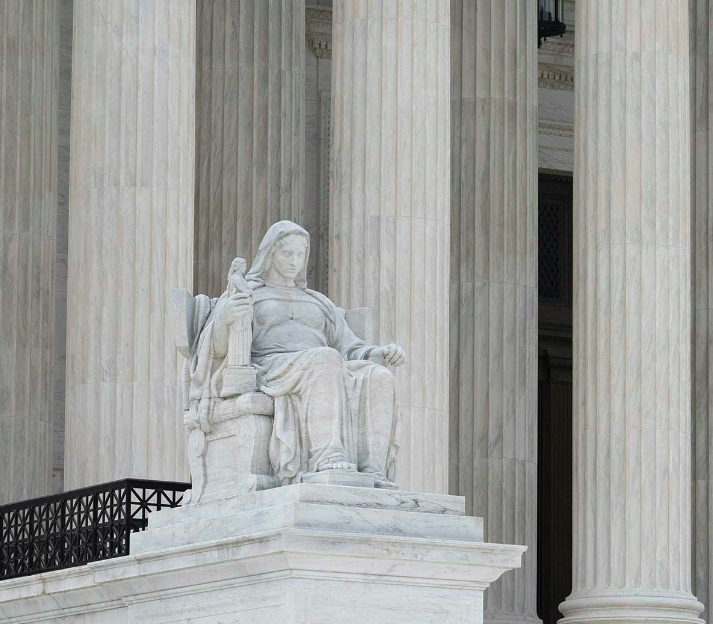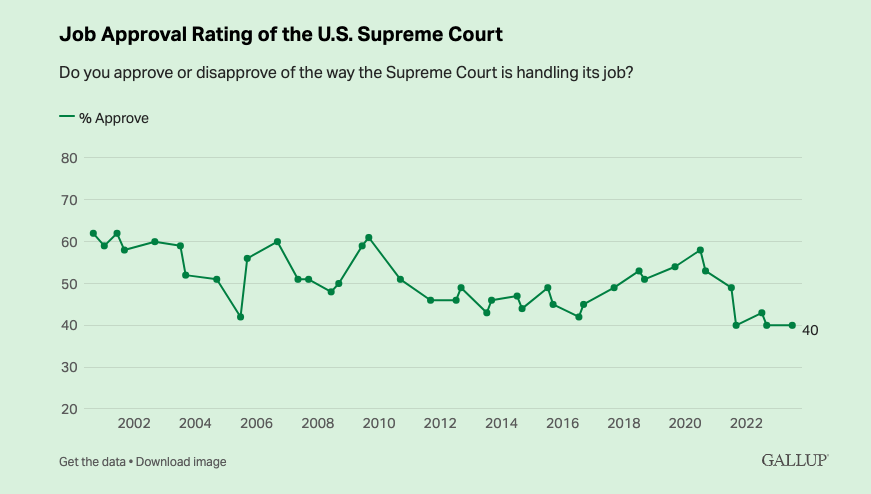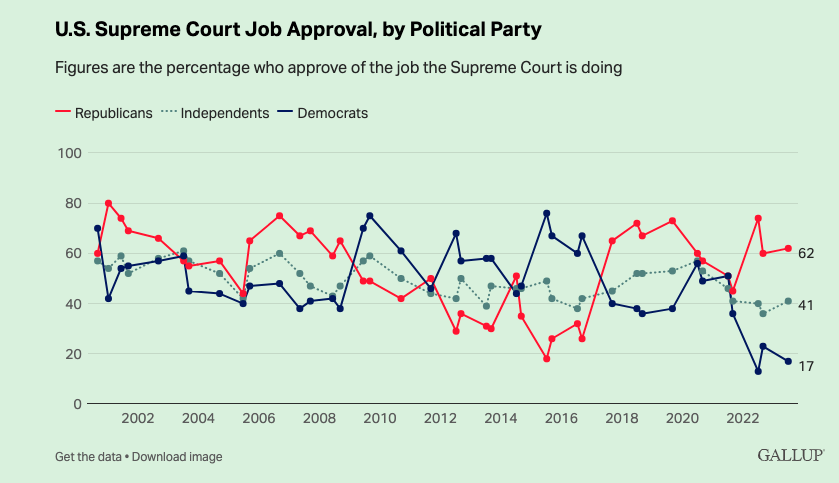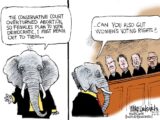By Glynn Wilson –
Public Opinion Analyst –
WASHINGTON, D.C. — American public approval of the United States Supreme Court remains the lowest in public opinion history as this conservative majority of 6-3 made up of Trump and Bush appointees continues its onslaught of rulings upending decades of established precedent.
The latest public approval rating as measured in the latest Gallup poll shows no recovery from the court’s record-low job score first recorded in September 2021. Only 40 percent of Americans approve of the job this court is doing.
The reputation of the court has been marred by its shocking upending of established precedent, known in legal terms as stare decisis, along with the ethical scandals of Justice Clarence Thomas, who has been in the news recently over serious ethical questions surrounding trips and other gifts he received from a wealthy conservative businessman, and for his wife’s political activism on behalf of Trump’s attempt to overturn the 2020 presidential election.
The most recent summer term was almost as bad or worse than the term last summer when the court struck down Roe v. Wade, issued a ruling that will hamper U.S. efforts to combat climate change, and destroyed any remnants of a wall separating church and state.
Related: Supreme Court Dismantles Liberty, Rights and Freedoms, and Not Just for Women
During this year’s term, the Supreme Court ruled that colleges could not use race as a factor in deciding admissions, striking down Affirmative Action once and for all.
Related: Conservative Supreme Court Strikes Down Affirmative Action
It also struck down President Joe Biden’s student-loan debt-forgiveness plan, and issued a ruling that will allow business owners to openly discriminate against gay and lesbian consumers on free speech grounds.
So far, the court has done nothing to revise its ethics code or in any way censure Thomas, who is far out of line with anything resembling an ethical judge.
Related: Supreme Court Justice Clarence Thomas and A Cozy Friendship With Billionaire Harlan Crow
This is not lost on the public, even though many who self identify as conservatives and Republicans do not appear to be concerned about established precedent or ethics in justices, although that is not universal.
Only 62 percent of Republicans approve of the job this court is doing, while only 17 percent of Democrats do, along with only 41 percent of independents.
For much of American history, the high court enjoyed a highly favorable public approval rating as the final arbiter of justice in the land, seen by most as the branch of government the most isolated from partisan politics. Not anymore.
When Gallup first began exploring the question in 2000, the court enjoyed a 62 percent approval rating, far higher than most other institutions in American society. It averaged more than a majority 50 percent approval until Trump appointed his first justice, when the court fell below 50 percent for the first time.
From 2017 to mid-2021, the court’s approval rating averaged 49 percent still, but its rating plunged to 40 percent in September 2021 after it allowed a restrictive Texas abortion law to stand. That ruling was a precursor to its June 2022 Dobbs v. Jackson Women’s Health Organization decision overturning Roe v. Wade. More than a dozen states have now passed legislation to nearly totally ban all forms of abortion.
In addition to measuring support for the Supreme Court generally, the latest Gallup poll asked Americans whether they have a favorable or unfavorable opinion of Chief Justice John Roberts and Associate Justice Clarence Thomas, the longest-serving member on the court.
Currently, 43 percent of Americans have a favorable opinion of Roberts and 30 percent an unfavorable one, with 27 percent not having an opinion either way.
Americans’ views of Thomas are divided, with 42 percent viewing him negatively and only 39 percent viewing him positively, while 19 percent say they have no opinion.
Roberts’ highest favorable rating was 50 percent in September 2005, after then-president George W. Bush nominated him as chief justice to the Supreme Court.
Gallup’s last measurement of Thomas, in 2005, was his best to date, with roughly twice as many Americans having a favorable (44%) as unfavorable (23%) opinion of him.
Republicans are not surprisingly slightly more positive toward Thomas, with 67 percent giving him a favorable rating, while Democrats are much more critical of him, with 76 percent viewing him unfavorably.
Gallup’s Bottom Line
“Americans continue to be critical of the Supreme Court, largely because of strongly negative views from Democrats and more negative than positive opinions from independents, which offset Republicans’ generally positive opinions,” Gallup says in its analysis of the numbers.
“The 6-3 conservative majority has been criticized for upending prior court precedents on voting rights, environmental regulations, abortion and affirmative action. While those rulings have pleased Republicans, they have left the court with the lowest sustained approval ratings Gallup has measured for it. Additionally, a minority of Americans, 47 percent, last fall expressed trust in the judicial branch of the federal government, a record low that came after decades when trust in the high court never fell below 60 percent.”
















